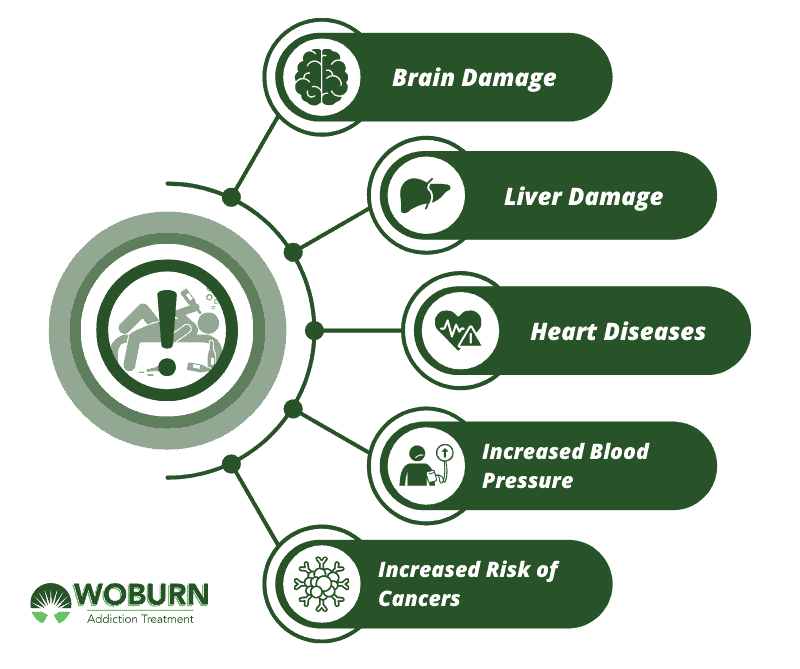Many people believe the misconception that there are only two types of drinkers: non-alcoholics and alcoholics. While you can enjoy alcohol without suffering from problematic drinking behaviors, alcohol addiction exists on a spectrum, meaning you could be drinking in a way that isn’t healthy, without qualifying as a full-blown alcoholic.
But how do you determine if you are drinking too many drinks per week?
It can be difficult to determine whether you are consuming too much alcohol, as everyone’s body processes the substance differently. However, there are guidelines in place that can suggest whether your alcohol consumption is becoming worrisome and whether or not it is time to seek professional help.
How Many Drinks Per Week Is Considered Excessive?
The National Institute on Alcohol Abuse and Alcoholism (NIAAA) provides some guidelines to clarify what is moderate vs excessive drinking.
First, you need to understand what counts as one alcoholic beverage. The NIAAA defines one alcoholic drink as:[1]
- 12 fluid ounces of beer (at 5% alcohol content)
- 8-9 fluid ounces of malt liquor (at 7% alcohol content)
- 5 fluid ounces of wine (at 12% alcohol content)
- 1.5 fluid ounces or a shot of 80-proof distilled spirits (at 40% alcohol content)
Understanding these guidelines will help you decipher whether you are drinking too much at once. According to the NIAAA, consuming more than 4 drinks per day or 14 per week is considered heavy drinking for men. For women, consuming more than 3 drinks per day or 7 drinks per week is excessive.[2]
The reason that there is such a difference in the amount of alcohol that men and women can drink is due to how our bodies metabolize the substance. Women’s bodies are typically smaller, contain less water, and have a higher liver-to-lean body mass ratio, causing them to metabolize alcohol differently than men.
According to research posted by Duke University, women absorb more alcohol into their bloodstream.[3] This is why women are suggested to drink less per week than men.
What are the Health Risks of Heavy Drinking?
If you have ever experienced a hangover, you can attest that excessive alcohol consumption is not kind to the body. Having too many drinks per week can take a serious toll on your health and overindulging in alcohol frequently can increase your risk of developing physical health conditions.
Aside from the possibility of developing an addiction to the substance, alcohol can lead to an array of severe health consequences. The most common health risks associated with heavy drinking.

Brain Damage
Alcohol is known to disrupt certain neurotransmitters in the brain, leading to impairment in the way your brain functions. The disruptions in nerve communication that alcohol can cause may lead to impaired motor skills, unpredictable mood swings, and an inability to think clearly. Additionally, heavy drinking can cause permanent brain damage that alters the physical structure of the brain.[4]
Liver Damage
Alcohol is metabolized in the liver, however, the liver can only successfully metabolize one drink per hour. This means that heavy drinking can leave an excess of alcohol circulating and saturating your body. Alcohol-related liver damage can lead to fibrosis, cirrhosis, alcoholic hepatitis, and steatosis.[5]
Heart Disease
Drinking alcohol excessively can also cause significant damage to your heart. Some of the heart complications associated with heavy drinking include the weakening of the heart muscles (cardiomyopathy), arrhythmias or irregular heartbeats, strokes, heart attacks, and increased blood pressure.[6]
Increased Risk of Cancers
If you regularly consume excessive amounts of alcohol, you could increase your risk of developing certain cancers. Any part of the body that comes in contact with alcohol could develop cancer. For example, excessive alcohol consumption increases the risk of mouth, throat, liver, and breast cancers.[7]
How to Tell If You Need Help for Alcoholism
If you find that you frequently engage in heavy drinking or drinking more than you should on a weekly basis, you may suffer from an alcohol use disorder.
Do you have difficulty saying no to drinking even when you have other responsibilities to care for? Do you find that you continually drink alcohol even though you get into risky situations almost every time? These are signs of a drinking problem.
Other common signs and symptoms of alcoholism include:
- Being unable to limit the amount of alcohol you drink
- Wanting to cut down on your alcohol consumption and making unsuccessful attempts to do so
- Feeling strong urges or cravings to drink alcohol
- Failing to fulfill major obligations and responsibilities due to alcohol consumption
- Spending a lot of time drinking, getting alcohol, or recovering from alcohol use
- Continuing to drink even though you know it’s causing physical, social, work, or relationship issues
- Giving up previously beloved activities to use alcohol
- Using alcohol in situations where it is unsafe, such as while driving
- Developing a tolerance to alcohol (needing more of the substance to experience an effect)
- Experiencing withdrawal symptoms when you do not drink alcohol

Get The Care You Need and Deserve
Woburn Addiction Treatment is a leader in the addiction treatment field, with proven success in facilitating long-term recovery. Our team of top clinical & medical experts specializes in treating addiction coupled with mental illness, ensuring that each person receives individualized care. Call us – we’re available 24/day, 7 days/week.
If you can relate to any of the previously mentioned symptoms of alcoholism, it’s time to seek professional help. Alcoholism can lead to an array of health issues as mentioned above, which can lead to life-threatening complications. Attending a licensed treatment program can allow you to regain control of your life.
Get Connected With a Reputable Alcoholism Treatment Center Today
If you or a loved one suffer from alcoholism, Woburn Addiction Treatment is here to help. We understand how hard it is to overcome an alcohol use disorder, so we make it a priority to ensure that all of our patients feel safe and comfortable throughout the treatment process. Our Massachusetts alcohol rehab combines proven therapeutic methods of healing with effective holistic modalities, making for integrated and highly individualized care that cannot be found anywhere else in the area. There are many things that set Woburn Addiction Treatment apart – for one, we offer an extremely unique set of therapeutic services and we will customize a long-term program of alcohol addiction treatment based on your individual needs, requirements, and treatment goals. To learn more about our alcoholism rehab program, contact us today.
- https://www.niaaa.nih.gov/alcohols-effects-health/alcohols-effects-body
- https://www.niaaa.nih.gov/alcohol-health/overview-alcohol-consumption/moderate-binge-drinking
- https://sites.duke.edu/apep/module-1-gender-matters/content/content-gender-differences-in-alcohol-metabolism/
- https://pubs.niaaa.nih.gov/publications/aa63/aa63.htm
- https://www.nhs.uk/conditions/alcohol-related-liver-disease-arld
- https://www.drinkaware.co.uk/facts/health-effects-of-alcohol/alcohol-related-diseases/alcohol-and-the-heart
- https://www.cancer.gov/about-cancer/causes-prevention/risk/alcohol/alcohol-fact-sheet


